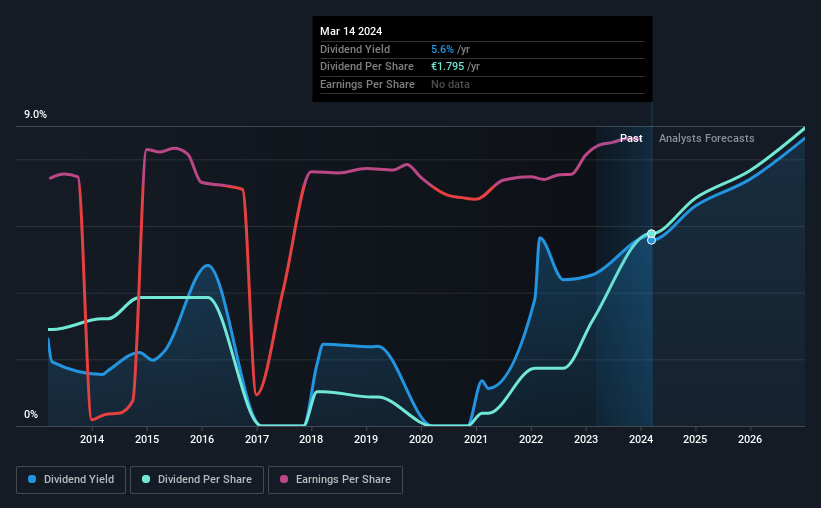UniCredit's (BIT:UCG) Shareholders Will Receive A Bigger Dividend Than Last Year

UniCredit S.p.A. (BIT:UCG) will increase its dividend from last year's comparable payment on the 24th of April to €1.8. Based on this payment, the dividend yield for the company will be 5.6%, which is fairly typical for the industry.
While the dividend yield is important for income investors, it is also important to consider any large share price moves, as this will generally outweigh any gains from distributions. Investors will be pleased to see that UniCredit's stock price has increased by 36% in the last 3 months, which is good for shareholders and can also explain a decrease in the dividend yield.
Check out our latest analysis for UniCredit
UniCredit's Payment Expected To Have Solid Earnings Coverage
Solid dividend yields are great, but they only really help us if the payment is sustainable.
UniCredit has established itself as a dividend paying company with over 10 years history of distributing earnings to shareholders. Taking data from its last earnings report, calculating for the company's payout ratio shows 38%, which means that UniCredit would be able to pay its last dividend without pressure on the balance sheet.
Over the next 3 years, EPS is forecast to expand by 22.8%. Analysts forecast the future payout ratio could be 49% over the same time horizon, which is a number we think the company can maintain.

Dividend Volatility
The company's dividend history has been marked by instability, with at least one cut in the last 10 years. Since 2014, the annual payment back then was €0.90, compared to the most recent full-year payment of €1.8. This implies that the company grew its distributions at a yearly rate of about 7.1% over that duration. We like to see dividends have grown at a reasonable rate, but with at least one substantial cut in the payments, we're not certain this dividend stock would be ideal for someone intending to live on the income.
The Dividend Looks Likely To Grow
Growing earnings per share could be a mitigating factor when considering the past fluctuations in the dividend. It's encouraging to see that UniCredit has been growing its earnings per share at 26% a year over the past five years. Earnings per share is growing at a solid clip, and the payout ratio is low which we think is an ideal combination in a dividend stock as the company can quite easily raise the dividend in the future.
UniCredit Looks Like A Great Dividend Stock
In summary, it is always positive to see the dividend being increased, and we are particularly pleased with its overall sustainability. Earnings are easily covering distributions, and the company is generating plenty of cash. All in all, this checks a lot of the boxes we look for when choosing an income stock.
Companies possessing a stable dividend policy will likely enjoy greater investor interest than those suffering from a more inconsistent approach. At the same time, there are other factors our readers should be conscious of before pouring capital into a stock. For example, we've identified 2 warning signs for UniCredit (1 can't be ignored!) that you should be aware of before investing. If you are a dividend investor, you might also want to look at our curated list of high yield dividend stocks.
New: AI Stock Screener & Alerts
Our new AI Stock Screener scans the market every day to uncover opportunities.
• Dividend Powerhouses (3%+ Yield)
• Undervalued Small Caps with Insider Buying
• High growth Tech and AI Companies
Or build your own from over 50 metrics.
Have feedback on this article? Concerned about the content? Get in touch with us directly. Alternatively, email editorial-team (at) simplywallst.com.
This article by Simply Wall St is general in nature. We provide commentary based on historical data and analyst forecasts only using an unbiased methodology and our articles are not intended to be financial advice. It does not constitute a recommendation to buy or sell any stock, and does not take account of your objectives, or your financial situation. We aim to bring you long-term focused analysis driven by fundamental data. Note that our analysis may not factor in the latest price-sensitive company announcements or qualitative material. Simply Wall St has no position in any stocks mentioned.
About BIT:UCG
UniCredit
Provides commercial banking services in Italy, Germany, Central Europe, and Eastern Europe.
Very undervalued with proven track record and pays a dividend.


